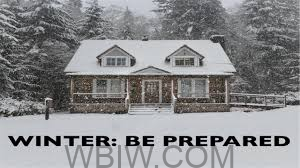
INDIANA – The air is getting more relaxed, and the leaves and cornfields are turning yellow. Fall is here. With the change in weather comes a list of home maintenance that all homeowners should tackle before the icy stuff sets in.

BBB offers these tips when preparing your home for the colder weather:
Clean those gutters. A build-up of leaves and other debris can cause your gutters and downspouts not to drain correctly. Improper draining can make water spill over your gutters, leading to foundation/basement damage and damage to your fascia boards. In the winter, ice dams can form that can let snow melt underneath your shingles.
Inspect your roof. Inspect your roof for loose or damaged shingles and make any necessary repairs. Damaged or loose shingles can let in water and ice during the winter, creating interior damage.
Test your smoke and carbon dioxide detectors. Making sure these essential safety tools are in proper working condition is manageable and vital to ensuring the safety of those in your home. The National Fire Protection Association offers excellent information on installing and maintaining smoke alarms.
Check your window and doors for air leakage. Adding caulk and weather stripping helps prevent cold air leakage into your home and prevents spiders and insects from entering. Also, check where pipes and wires enter your home.
Organize your garage. You will undoubtedly use your garage a lot more in the colder months. Get rid of trash and clutter, and make sure your snow shovel and other winter-use items are easily accessible. Fill/repair any cracks or holes you see to prevent bugs and rodents from entering that will be seeking refuge from the cold.
Inspect your driveway. The frequent freezing and thawing conditions in many areas, along with tree roots and ground shifting, can cause driveways to develop areas of needed repair. Fall is a great time to fill cracks and seal coats to prevent wintertime water/ice damage.
Schedule HVAC maintenance. According to the U.S. Department of Energy, preventive care can help save you up to 25% in energy costs. Having your heating system serviced and filters replaced will ensure your system works efficiently.
Tend to the outside water supply. Cover up your outdoor water fixture (s). Spigot covers are reasonably priced at your local hardware store and help keep the exterior pipes from freezing. Empty hoses of any water and move them indoors.
Protect pipes. Insulate pipes in unheated areas, like attics, basements, and crawl spaces. Running a slow drip of water from faucets during extremely cold weather can also help prevent pipes from freezing.
Prepare the garden and yard. Trim trees and bushes away from your home to prevent heavy snow or ice damage. Clean up leaves and debris to prevent pests from finding shelter.
Store patio furniture and other outdoor items. Put away or cover outdoor furniture, grills, and other summer items to protect them from winter weather.
Stock up on winter supplies. Have salt or ice melt, shovels, and other winter supplies on hand for snow and ice removal.
Sweep your chimney. If you have a fireplace, clean and inspect the chimney before using it. Ensure the damper works properly to prevent drafts when the fireplace is not in use. Having the soot and possible blockages or creosote build-up helps reduce the risk of a chimney fire and can improve the efficiency of your fireplace.
Reverse ceiling fans. In the colder months, you want your fan to move the warm air down, which means having your blades turn clockwise.
Test backup generators. If you have a backup generator, test it to ensure it’s in working condition in case of power outages.
Review your emergency plan. Review your family’s emergency plan, including how to stay warm, communication, and evacuation procedures in an emergency.
Check for BBB Accreditation for any professionals you may hire. Go to BBB.org to check the trustworthiness of a business. Do a general online search on a company to see what reviews and other information may be available.
For more information and to learn how to protect yourself, Google “BBB 10 Steps to Avoid Scams”. If you spot a scam, whether you have lost money or not, report it to BBB’s Scam Tracker at BBB.org/ScamTracker and the FTC at ReportFraud.ftc.gov. Your story can help protect consumers from similar scams.



